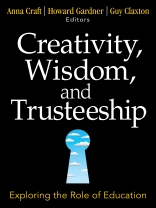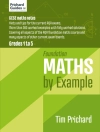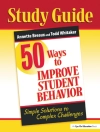‘In today′s ′teach-to-the-test′ climate, do we ever need a book about wisdom and creativity! Our focus as educators is enriched by this book.’
—Robert Di Giulio, Professor
Johnson State College
‘Creativity, wisdom, and trusteeship may each sound good enough in itself, but the contributors to this volume make a compelling case for how much they need one another.’
—David Perkins, Professor
Harvard University
How do creativity, wisdom, and trusteeship translate into ‘excellent and ethical’ educational practices?
This important new volume from Anna Craft, Howard Gardner, and Guy Claxton focuses on the need to educate for ‘wise creativity’ so that students will learn to expand their perspectives and exercise their talents responsibly within their school community and in the real world.
The editors′ theories, plus contributions from noted scholars Dean Keith Simonton, David Henry Feldman, Jonathan Rowson, Helen Haste, Patrick Dillon, Hans Henrik Knoop, Christopher Bannerman, Robert J. Sternberg, and Dave Trotman, develop a concept of teachers as ‘trustees, ‘ or respected, nonpartisan role models who can exercise wise creativity in their classrooms and cultivate this quality in their students.
The book explores a wide range of questions, such as:
- What is the nature of creativity and wisdom and what does it mean to exercise a balance between the two?
- What do creativity, wisdom, and trusteeship look like in society and in the school community?
- How can schools educate for creativity tempered by wisdom?
- What does it take to nurture trustee leadership in the classroom and schoolwide?
Thought-provoking and incisive, Creativity, Wisdom, and Trusteeship is essential reading for all members of the educational community.
Tabella dei contenuti
Acknowledgments
About the Editors
About the Contributors
1. Nurturing Creativity, Wisdom, and Trusteeship in Education: A Collective Debate – Anna Craft, Howard Gardner, Guy Claxton
Part One: Stimulus Chapters on Creativity, Wisdom, and Trusteeship
2. Tensions in Creativity and Education: Enter Wisdom and Trusteeship? – Anna Craft
3. Wisdom: Advanced Creativity? – Guy Claxton
4. Creativity, Wisdom, and Trusteeship – Howard Gardner
Part Two: Response Chapters on Creativity, Wisdom, and Trusteeship
5. Creative Wisdom: Similarities, Contrasts, Integration, and Application – Dean Keith Simonton
6. Creativity and Wisdom: Are They Incompatible? – David Henry Feldman
7. How Are We Disposed to Be Creative? – Jonathan Rowson
8. Good Thinking: The Creative and Competent Mind – Helen Haste
9. Creativity, Wisdom, and Trusteeship: Niches of Cultural Production – Patrick Dillon
10. Wise Creativity and Creative Wisdom – Hans Henrik Knoop
11. Creativity and Wisdom – Christopher Bannerman
12. Leadership as a Basis for the Education of Our Children – Robert J. Sternberg
13. Liberating the Wise Educator: Cultivating Professional Judgment in Educational Practice – Dave Trotman
Part Three: Synthesizing Creativity, Wisdom, and Trusteeship
14. Concluding Thoughts: Good Thinking — Education for Wise Creativity – Guy Claxton, Anna Craft, Howard Gardner
Index
Circa l’autore
Guy Claxton is Professor of the Learning Sciences at the University of Bristol Graduate School of Education, where he directs the research initiative on Culture, Learning, Identity and Organisations (CLIO). His books include The Wayward Mind: An Intimate History of the Unconscious (2005), Learning for Life in the 21st Century: Sociocultural Perspectives on the Future of Education (2002, co-edited with Gordon Wells), Wise Up: Learning to Live the Learning Life (1999) and the best-selling Hare Brain, Tortoise Mind: Why Intelligence Increases When You Think Less (1997). His current work focuses on the development of infused approaches to the cultivation of positive lifelong learning dispositions in schools. The resulting ′Building Learning Power′ approach has influenced practice in schools throughout the UK, Australia and New Zealand.












